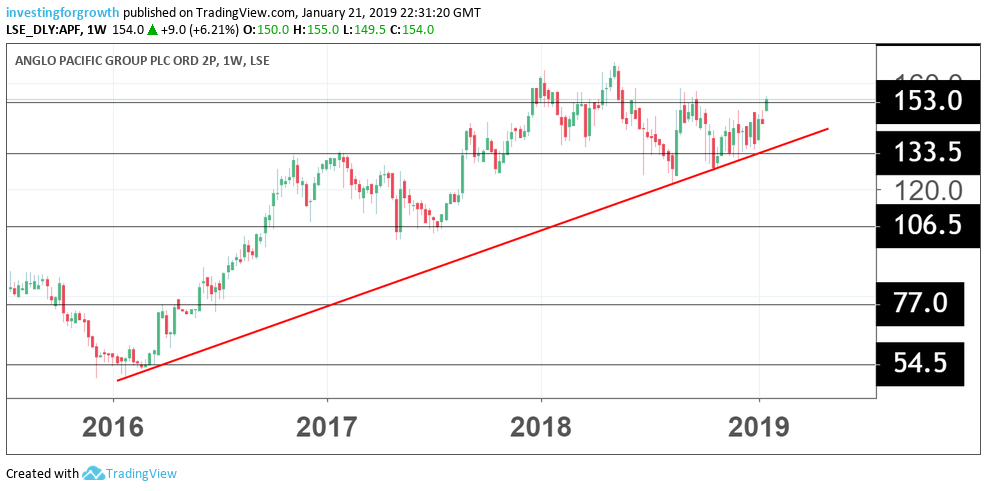Stockwatch: A 6% yield, director buying and raised guidance
22nd January 2019 09:24
by Edmond Jackson from interactive investor
Shares have trebled in three years, but our companies analyst backs this high-yielding commodities firm.

Is coal a credible investment versus the weight of environmental opinion against it? Ethics aside, does this add up to a negative bias against coal-oriented equities, potentially useful for value or a liability in terms of downward trend?
A coal-related stock I've liked over the long-term is Anglo Pacific Group (LSE:APF), a mining 'royalties' group that owns non-operating interests in mining projects – principally coking/metallurgical coal in Australia, but also minority operations in iron ore, nickel and uranium, in Europe and the Americas.
While prone to be volatile in response to shifting sentiment towards commodities, the stock has advanced usefully, trebling in the last three years and paying a dividend equivalent to a circa 5% yield.
It has thrived over various cycles, originally founded in 1967 and first listed on the Unlisted Securities Market in 1984, growing Australian assets from 1989 and gaining a full London listing in 1996; therefore, you could say, a £277 million value (with the stock currently at 153p) after all this time implies it is a niche operator hardly going great guns.
Recent drivers have been macro and managerial
A chief factor for coking coal prices (used to make stainless steel) has been urbanisation of China which has soared from 26% of the population in 1990 to over 59% by end-2017. Although the current focus is on China's GDP growth slowing to its slowest pace in 28 years during 2018, 6.6% was respectable in global context despite slowing consumption and trade war issues.
More specifically, the Chinese government continues to urbanise the country, aiming to integrate 70% of its population into cities by 2025. It can still be tricky to gauge the effect of China's demand on metallurgical coal - its price still plunged post 2008 and sensational stories have cropped up of "ghost cities" due to over-investment to meet regional targets.

Source: TradingView, weekly chart (*) Past performance is not a guide to future performance
Julian Treger becoming Anglo's chief executive in 2013, accumulating a 9.33% stake, has been a potentially transforming change at the company level. This South African's original foray on the London stockmarket goes back to the late 1980’s with Brian Myerson by way of the "Active Value" fund that took stakes in underperforming companies and pressed for changes; though itself became subject to criticism.
As regards gung-ho behaviour, I recall Treger favouring the takeover of AIM-listed Western Canadian Coal by US-listed Walter Energy. Then, the investment advisory firm he founded had a material stake in Western, which was initially good for the share price but led to disaster when the over-indebted group could not cope with the plunge in commodity process post the 2008 crisis. The hope is Treger has learned from such experience to have matured his judgment in his mid-fifties, yet still be an initiator.
Operating profit leapt 123% in 2017 to £28.4 million as royalty income soared; a dilemma at the pre-tax level being revaluations at Kestrel, a key Australian interest, which boosted 2016 then hit 2017, thus affecting comparisons. Last year, the stock traded in a 125p to 166p range as the market looked for proof of early 2018 hopes, global growth would continue, although China's slowing growth rate has prompted questions for commodities demand.
Sentiment also shifted against coal, not just among environmental scientists, as institutional investors rallied against all coal burning at a UN climate summit last December. Dozens of nations have also committed to this, although US, Chinese and Japanese investors have provided nearly $500 billion equivalent for new coal plants since the September 2018 Paris Agreement on climate change.
| Anglo Pacific Group - financial summary | Consensus estimates | ||||||
|---|---|---|---|---|---|---|---|
| year ended 31 Dec | 2013 | 2014 | 2015 | 2016 | 2017 | 2018 | 2019 |
| Turnover (£ million) | 14.7 | 3.5 | 8.7 | 19.7 | 37.4 | ||
| IFRS3 pre-tax profit (£m) | -52.9 | -42.4 | -30.5 | 28.3 | 11.8 | ||
| Normalised pre-tax profit (£m) | -11.7 | -13.5 | -24.5 | 28.0 | 11.5 | 37.2 | 31.6 |
| Operating margin (%) | 66.5 | -55.4 | 30.3 | 78.0 | 64.1 | ||
| IFRS3 earnings/share (p) | -39.0 | -42.1 | -14.1 | 15.6 | 15.6 | ||
| Normalised earnings/share (p) | -1.2 | -16.5 | -10.4 | 15.4 | 5.3 | 33.7 | 36.2 |
| Earnings per share growth (%) | -65.9 | 541 | 7.3 | ||||
| Price/earnings multiple (x) | 29.8 | 4.5 | 4.4 | ||||
| Cash flow/share (p) | 3.6 | 3.2 | 0.2 | 5.5 | 19.3 | ||
| Capex/share (p) | -1.9 | 4.4 | 24.8 | -2.0 | -1.4 | ||
| Dividends per share (p) | 10.8 | 10.2 | 8.5 | 7.0 | 7.5 | 12.6 | 13.7 |
| Yield (%) | 4.9 | 8.2 | 9 | ||||
| Covered by earnings (x) | 2.2 | 1.3 | 2.7 | 2.6 | |||
| Net tangible assets per share (p) | 144 | 98.1 | 53.2 | 76.6 | 76.2 | ||
Company REFS Past performance is not a guide to future performance
Update for 2018 guides for circa 15% revenue growth
In this wary macro context, Anglo has published a 2018 year-end update citing a 15% increase in annual portfolio income to £48-50 million, Q4 achieving the highest single quarter overall since Q2 2010.
Coal prices higher than anticipated a year ago have helped, also £38 million of acquisitions which explain £8.1 million net cash becoming £3.1 million net debt on the balance sheet. Debt will be eliminated, however, after receiving Q4 2018 royalty income, with up to £70 million available for growth via a credit facility.
The total dividend is guided at not less than 7p (of which 4.875p has already been paid) which would be only a marginal advance on 7p last year: while the table shows 7.5p I would mind databases refer to payments actually made than declared, and why you should always check company statements.
Nor do I see guidance as a disappointment relative to a 3 January consensus for a circa 13p prospective dividend which would have implied a near 9% yield than 5%; the market was clearly anticipating the latter given the stock has risen 6p on the update.
- Stockwatch: An interesting play on global growth
- Oil sector outlook for 2019
- Threats and opportunities in 2019
Possibly, it was helped by the prospect of a material uplift in production at the Kestrel mine during 2019 "comfortably over 10% better than broker consensus". Subject to commodity prices, Anglo ought to see "a noticeable uplift in revenue" which "should have positive implications for the level of dividends in 2019."
If a circa 13p dividend is achieved as projected, then it implies an 8.5% yield which looks doubtful. Personally, I would target a rise to roughly 9p in the current year as the board could be unwise to raise the dividend more substantially lest commodities turn volatile. I could be over-cautious given pre-tax profit expectations in a £30 million range look quite fair relative to £18.6 million achieved at interims. Earnings per share (EPS) was 7.2p whether basic or diluted, so I’d take full-year projections of about 35p with a pinch of salt.
A medium-term 9p dividend for a near-6% yield would represent material growth, due respect to volatile commodity prices, also a decent balance between shareholder returns and takeovers.
Non-executive directors adding to sizable stakes
Last 20 December, a non-executive director of nearly five years bought 13,000 shares at 138.1p to own some 374,000 in total, so he believes the market price is in a range offering value. It follows the chairman's purchase of 14,250 shares last October, to own 231,927 in total.
Peel Hunt, the company's broker, targets 205p in a context of £55 million royalty income for 2019 versus circa £46 million, according to the latest update; and £6 million operating expenses versus £3.1 million in the first half of 2018.
I regard the chief risk both to commodity prices and sentiment as being a worse-than-expected slowdown in China; albeit a cloud with a silver lining because it would hasten progress on trade with the US and prompt economic stimulus.
Longer-term I suspect the anti-coal environmental agenda will mean industry consolidation, potentially to include royalty interests. Coal may be damned but isn't going away, not for plenty of years. Thus, a CEO like Treger who is financially pro-active, should be able to take advantage of acquisition opportunities and position the group eventually for sale.
Having drawn attention to Anglo various times in recent years, as a 'buy/hold', on current information it appears the share buying coincides with raising guidance, hence: Add.
*Horizontal lines on charts represent levels of previous technical support and resistance. Trendlines are marked in red.
Edmond Jackson is a freelance contributor and not a direct employee of interactive investor.
These articles are provided for information purposes only. Occasionally, an opinion about whether to buy or sell a specific investment may be provided by third parties. The content is not intended to be a personal recommendation to buy or sell any financial instrument or product, or to adopt any investment strategy as it is not provided based on an assessment of your investing knowledge and experience, your financial situation or your investment objectives. The value of your investments, and the income derived from them, may go down as well as up. You may not get back all the money that you invest. The investments referred to in this article may not be suitable for all investors, and if in doubt, an investor should seek advice from a qualified investment adviser.
Full performance can be found on the company or index summary page on the interactive investor website. Simply click on the company's or index name highlighted in the article.
Disclosure
We use a combination of fundamental and technical analysis in forming our view as to the valuation and prospects of an investment. Where relevant we have set out those particular matters we think are important in the above article, but further detail can be found here.
Please note that our article on this investment should not be considered to be a regular publication.
Details of all recommendations issued by ii during the previous 12-month period can be found here.
ii adheres to a strict code of conduct. Contributors may hold shares or have other interests in companies included in these portfolios, which could create a conflict of interests. Contributors intending to write about any financial instruments in which they have an interest are required to disclose such interest to ii and in the article itself. ii will at all times consider whether such interest impairs the objectivity of the recommendation.
In addition, individuals involved in the production of investment articles are subject to a personal account dealing restriction, which prevents them from placing a transaction in the specified instrument(s) for a period before and for five working days after such publication. This is to avoid personal interests conflicting with the interests of the recipients of those investment articles.